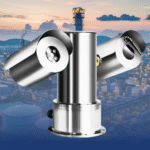Artificial Intelligence (AI) has evolved into one of the most transformative technologies in 192. 168. 101. 23:5244 modern history. Its application spans across industries, reshaping the way we live, work, and interact with the world around us. From healthcare to finance, and education to entertainment, AI is revolutionizing sectors at an unprecedented pace. This article explores the future of AI, how it’s transforming key industries, and what we can expect in the coming years.
Introduction: The Dawn of Artificial Intelligence
Artificial Intelligence, once the subject of science fiction, is now a crucial part of everyday life. Machines are learning to perform complex tasks, from recognizing speech to making predictions based on large datasets. AI’s capabilities have 192. 168. 101. 23:5244 grown exponentially, driven by advancements in machine learning, deep learning, and data analytics. As a result, AI is transforming industries, enhancing human productivity, and creating new possibilities for technological advancement.
AI in Healthcare: Revolutionizing Medical Treatment
One of the most promising areas where AI is making a significant impact is in healthcare. AI’s 192. 168. 101. 23:5244 ability to analyze vast amounts of data quickly and accurately is transforming medical diagnostics, treatment plans, and patient care.
Predictive Diagnostics and Personalized Medicine
AI can predict potential health risks based on data from various sources such as electronic 192. 168. 101. 23:5244 health records (EHRs), genetic information, and lifestyle data. This predictive analysis helps in early detection of diseases, allowing for timely intervention. Furthermore, AI enables personalized treatment plans tailored to an 192. 168. 101. 23:5244 individual’s unique medical profile.
Robotic Surgery
AI-powered robots are assisting surgeons in performing intricate operations with 192. 168. 101. 23:5244 precision and minimal invasiveness. These systems can analyze patient data and simulate different surgical approaches, helping doctors make better decisions during procedures.
AI-Driven Drug Development
The pharmaceutical industry is using AI to streamline drug discovery processes, significantly reducing the time and cost of bringing new medications to 192. 168. 101. 23:5244 market. AI algorithms can analyze biological data, predict drug efficacy, and identify potential side effects, accelerating the development of life-saving 192. 168. 101. 23:5244 treatments.
AI in Finance: Enhancing Decision-Making and Security
The financial sector is another domain where AI is driving innovation. From fraud 192. 168. 101. 23:5244 detection to personalized financial advice, AI is improving efficiency and security within the industry.
Fraud Detection and Risk Management
AI systems can detect unusual patterns in transaction data, identifying potential fraudulent 192. 168. 101. 23:5244 activity in real-time. By analyzing historical data, AI can predict and mitigate risks, offering enhanced security for both businesses and consumers.
Automated Trading Systems
AI algorithms are capable of 192. 168. 101. 23:5244 analyzing market data at lightning speed, making split-second trading decisions that maximize profit. These AI-driven systems have revolutionized stock trading by removing human biases and 192. 168. 101. 23:5244 improving the accuracy of market predictions.
Personalized Financial Services
AI-powered chatbots and virtual assistants provide personalized financial advice based on user 192. 168. 101. 23:5244 data. These systems analyze spending habits, investment portfolios, and financial goals, offering tailored recommendations to users, making financial management more accessible and efficient.
AI in Education: Creating a Personalized Learning Experience
AI is reshaping the education sector by providing personalized learning experiences and 192. 168. 101. 23:5244 automating administrative tasks. As education increasingly moves online, AI plays a critical role in enhancing the learning process for 192. 168. 101. 23:5244 students worldwide.
Adaptive Learning Platforms
AI-powered educational 192. 168. 101. 23:5244 platforms adapt to the learning pace and style of each student. These platforms offer personalized content, quizzes, and feedback, ensuring that students grasp concepts effectively. By analyzing student performance, AI systems can identify areas where learners need improvement and adjust the curriculum accordingly.
Intelligent Tutoring Systems
AI tutors are available 24/7, 192. 168. 101. 23:5244 providing instant assistance to students. These virtual tutors use natural language processing (NLP) to understand student queries and provide accurate explanations, creating a more interactive and engaging learning environment.
Streamlining Administrative Tasks
AI is also being used to 192. 168. 101. 23:5244 automate administrative tasks such as grading, attendance tracking, and scheduling. By freeing educators from these time-consuming duties, AI allows them to focus more on teaching and interacting with students.
AI in Transportation: Autonomous Vehicles and Smart Traffic Management

The transportation industry is undergoing a revolution thanks to AI-driven technologies such as autonomous vehicles and smart traffic management systems. These innovations 192. 168. 101. 23:5244 promise safer roads, reduced traffic congestion, and increased transportation efficiency.
Autonomous Vehicles
Self-driving cars, powered by AI, are one of the most significant advancements in the 192. 168. 101. 23:5244 automotive industry. These vehicles use AI algorithms to navigate roads, detect obstacles, and make decisions in real-time, all without human intervention. As the technology matures, autonomous vehicles could drastically reduce accidents caused by human error, making roads safer for everyone.
AI-Powered Traffic Management
Smart traffic systems powered by AI can monitor road conditions, predict traffic flow, and adjust traffic signals to reduce congestion. These systems use data from 192. 168. 101. 23:5244 cameras, sensors, and GPS devices to optimize traffic patterns, improving overall transportation efficiency in urban areas.
AI in Entertainment: Revolutionizing Content Creation and Consumption
AI is also making waves in the entertainment industry, changing the way content is created, distributed, and consumed. From personalized recommendations to 192. 168. 101. 23:5244 AI-generated music and art, the entertainment landscape is evolving rapidly.
Personalized Content Recommendations
AI algorithms power recommendation engines used by platforms like Netflix, YouTube, and Spotify. These algorithms analyze user behavior, preferences, and past 192. 168. 101. 23:5244 consumption patterns to suggest content tailored to individual tastes, enhancing the user experience.
AI-Generated Art and Music
AI is now capable of creating original music, artwork, and even films. AI-generated content is pushing the 192. 168. 101. 23:5244 boundaries of creativity, offering new opportunities for artists and creators to experiment with novel ideas and techniques.
Virtual Reality and AI Integration
AI and virtual reality (VR) are converging to create immersive entertainment experiences. AI enhances VR environments by generating realistic interactions 192. 168. 101. 23:5244 and adapting the virtual world to user actions in real-time, making virtual experiences more dynamic and engaging.
Ethical Considerations in AI Development
As AI becomes more integrated into various aspects of society, ethical considerations 192. 168. 101. 23:5244 surrounding its development and use are becoming more prominent. Issues such as bias, data privacy, and the potential for job displacement must be addressed to ensure that AI benefits everyone.
Addressing Algorithmic Bias
AI systems are only as unbiased as the data they are trained on. If datasets contain biased information, AI algorithms may perpetuate these biases, leading to 192. 168. 101. 23:5244 unfair outcomes. Ensuring that AI is trained on diverse and representative data is crucial to creating equitable systems.
Data Privacy and Security
With AI’s reliance on vast amounts of data, ensuring the privacy and security of this information is critical. Developers must implement robust encryption and security protocols to protect sensitive data and prevent unauthorized access.
Job Displacement and the Future of Work
AI has the potential to automate many tasks traditionally performed by humans, leading to concerns about job displacement. While AI will undoubtedly eliminate some jobs, it will also create new opportunities in areas such as AI development, maintenance, and ethics oversight. Preparing the workforce for these changes through education and reskilling programs is essential for a smooth transition.
The Future of AI: What to Expect
The future of AI is filled with exciting possibilities. As the technology continues to advance, we can expect AI to become even more integrated into our daily lives, driving innovation across multiple industries.
AI and Human Collaboration
AI will not replace humans but will augment human capabilities. Future AI systems will work alongside humans, automating routine tasks while enabling us to focus on more complex and creative endeavors.
Advanced AI in Healthcare
AI’s role in healthcare will continue to expand, with advanced systems capable of diagnosing rare diseases, predicting health outcomes, and assisting in the development of personalized treatments. AI-powered wearables may monitor our health in real-time, providing insights into our well-being and alerting us to potential issues before they become serious.
AI in Everyday Life
In the future, AI will become even more embedded in our daily routines. From smart homes that anticipate our needs to personal assistants that manage our schedules, AI will simplify our lives, allowing us to focus on what truly matters.
Conclusion: Embracing the Future of AI
The future of AI is both promising and challenging. As we continue to explore the potential of this technology, it is essential to address the ethical, societal, and economic implications of its widespread adoption. AI has the power to transform industries, enhance human capabilities, and improve our quality of life. By embracing AI and developing it responsibly, we can unlock a future filled with innovation, efficiency, and unprecedented opportunities.







